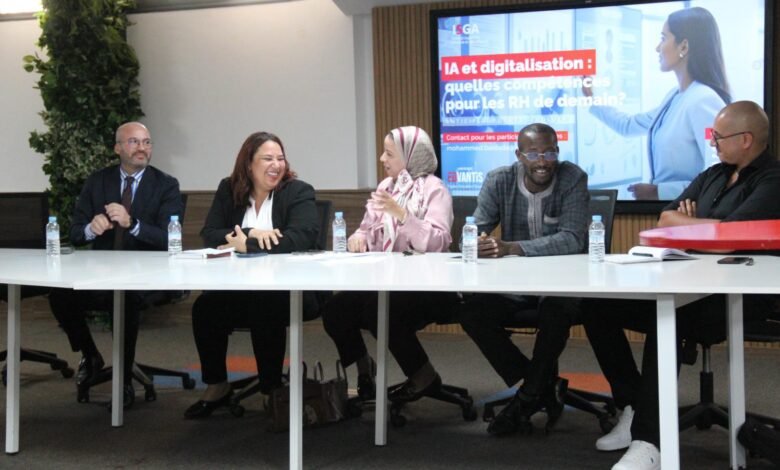Shaping Tomorrow’s Workforce: How Artificial Intelligence and Digital Tools Are Redefining Human Resources

By The New Africa Magazine
As artificial intelligence and digital technologies continue to disrupt traditional industries, Human Resources (HR) departments are experiencing a profound transformation. This was the focus of a high-level roundtable held at the Institut Supérieur d’Ingénierie et des Affaires (ISGA) in Rabat, where experts convened to examine the future competencies required of HR professionals in a digital era.
Moderated by Professor Mariyam El Idrissi, the event featured contributions from Karima Rhanem, President of the International Center for Diplomacy; Mactar Sarr, Chief Financial Officer at the Mohammed VI Foundation for Education; Charif Bounou, HR Director at Vivalis Salaf; and Abdelhamid Kheir, a doctoral researcher in human resources at Hassan II University.

Artificial Intelligence: Promise, Risk, and Responsibility
The discussion opened with a look at the increasing role of artificial intelligence in HR operations. While panelists acknowledged the benefits of automation and predictive analytics, they also raised important concerns.
Karima Rhanem pointed to the risk of algorithmic bias: “A poorly calibrated algorithm can unknowingly discriminate against certain profiles.” Several speakers warned of gender bias embedded in AI systems trained on unbalanced or historically discriminatory data. “We cannot blindly trust outputs if the data itself reflects social inequality,” added Sarr.

Beyond fairness, the panel emphasized that organizations must draw a clear line between artificial intelligence as a tool and intelligence as a human faculty. “Artificial intelligence must remain artificial,” said Kheir. “We need to understand it, apply it, and govern it — but never replace our ethical judgment with it.”
Bounou highlighted another emerging risk: overdependence. “If we offload too much responsibility to machines, we lose human critical thinking — and that’s a danger in itself.” He called for thoughtful human–AI collaboration, rather than blind automation.
Emotional Intelligence as a Prerequisite
A strong point of consensus emerged around the idea that emotional intelligence — including empathy, self-awareness, and relational insight — must be the foundation of any HR training program before introducing artificial intelligence tools.
“HR is fundamentally a human-centered discipline,” said Rhanem. “Before deploying machine learning or predictive analytics, HR professionals must be equipped to read human emotion, build trust, and manage conflict with emotional maturity.”
Panelists agreed that technology without emotional literacy can create distance, misinterpret signals, and even cause harm. Sarr added, “Artificial intelligence may suggest a hiring decision, but only emotional intelligence can judge a candidate’s leadership potential or cultural fit.” The group advocated for an integrated training model where digital fluency is layered on top of core human capabilities — not the other way around.
From Administration to Strategy
Digital transformation has shifted HR from its traditional administrative role into a strategic leadership function. “The automation of routine tasks such as payroll, onboarding, and leave management has freed HR teams to focus on driving innovation and organizational alignment,” noted Bounou.
HR is now expected to interpret data, anticipate workforce needs, and shape culture. “The decisions are no longer intuitive,” said Sarr. “They’re guided by dashboards, key performance indicators, and predictive models — all grounded in data.” Kheir added that communication, evaluation, and training have become increasingly hybrid, blending digital tools with human interaction.
The Infrastructure Question: Are We Ready?
But amid the optimism around innovation, a more sobering question was raised: to what extent are organizations actually prepared for the integration of AI?
Readiness, the panel agreed, is not just technical — it is structural and cultural. It requires resilient systems, strong internal bylaws, up-to-date legislation, and a workplace culture open to experimentation and transformation. “There is often a disconnect between technology deployment and organizational infrastructure,” warned Rhanem. “You cannot introduce AI into an environment with outdated processes and expect meaningful results.”
Kheir added that governance must evolve in parallel. “Without proper data policies, ethical frameworks, and digital leadership, even the most powerful tools will be misused or rejected.” The speakers called for organizations to conduct honest audits of their digital maturity and cultural readiness before investing in AI solutions.
The Competencies of the Future
Looking ahead, panelists outlined a blended skill set for the HR leaders of tomorrow. Digital competencies — from Human Resource Information Systems (HRIS) and Applicant Tracking Systems (ATS) to Robotic Process Automation (RPA) and blockchain — are essential. But so are the interpretive and ethical capacities that guide their application.
“Understanding cybersecurity, compliance, and governance will be just as important as understanding the tools themselves,” said Rhanem. Kheir stressed the ability to analyze workforce data, while Sarr underscored the importance of conceptual literacy in AI and data science. Yet all agreed that life experience, soft skills, and relational intelligence remain irreplaceable.
Training the Next Generation
To prepare for this shift, organizations must adopt robust, adaptive training models. Bounou described internal programs that combine e-learning and live workshops facilitated by the Information Technology department. Sarr emphasized the value of self-paced learning on platforms like Coursera, edX, and LinkedIn Learning, especially when paired with mentoring. Kheir called on academic institutions to embed digital HR modules into their curricula. Rhanem concluded that only training that integrates theory with real-world cases — using tools such as AI-powered recruitment software or sentiment analysis platforms — can truly equip HR professionals for what’s ahead.
The Role of Leadership
True transformation, the panel emphasized, requires leadership that embraces experimentation and empowers HR teams to shape innovation. That means involving HR professionals in tech projects from day one, promoting HR–Tech collaboration, creating internal learning labs, and embedding HR voices into corporate innovation committees.
The HR of the Future: Human at the Core
In closing, panelists agreed that the HR function of the future will be hybrid — digitally enhanced but human-led. “The human element will always be essential, especially in complex areas like leadership, conflict resolution, and cultural development,” said Rhanem.
Sarr described tomorrow’s HR leader as a strategic analyst and ethical decision-maker. Bounou envisioned HR as a designer of human systems, harmonizing people and machines within a shared culture. Kheir added that artificial intelligence will serve not as a replacement, but as an amplifier of human capacity — provided emotional intelligence remains at the center.
The roundtable left no doubt: while digital innovation is reshaping the HR profession, its long-term success depends on balancing intelligence — both artificial and emotional — with institutional readiness, ethical reflection, and a renewed commitment to humanity at work.





